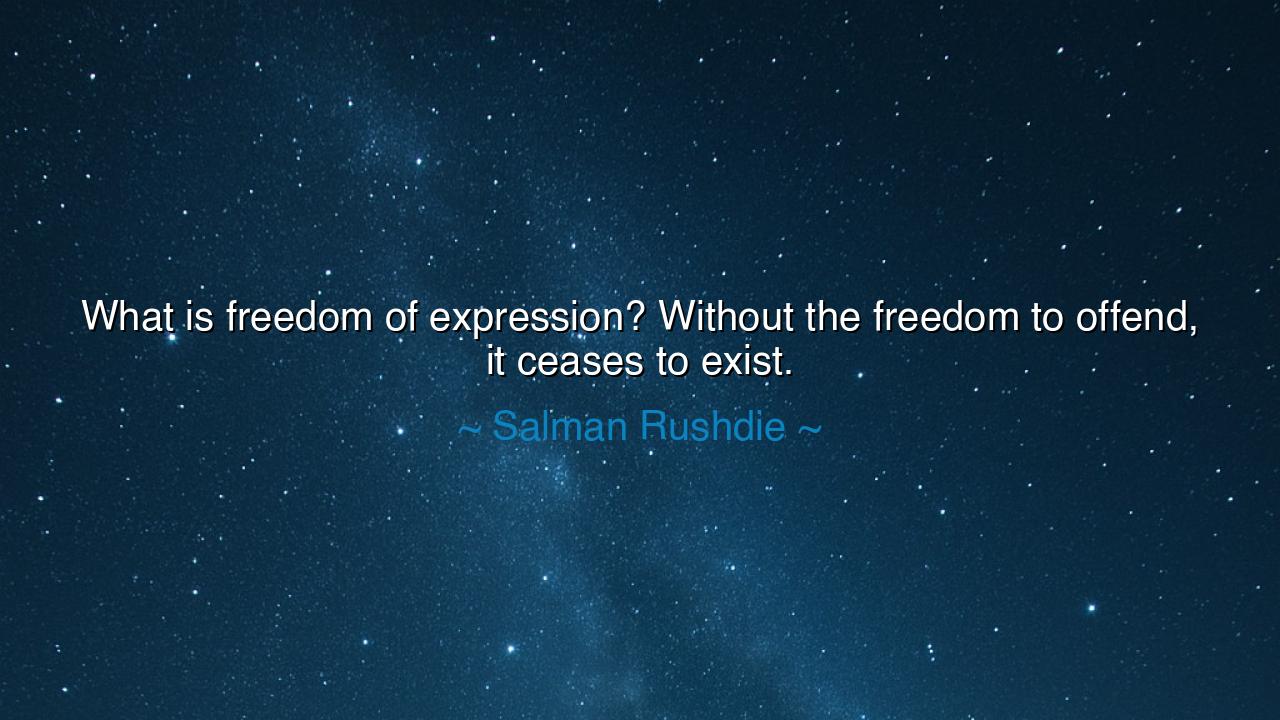
What is freedom of expression? Without the freedom to offend, it






Host: The room was quiet, the gentle hum of the city outside blending with the soft tick of a clock on the wall. Inside, the atmosphere was calm, but there was a sense of tension, as if the next words were going to break the stillness in a profound way. Jack sat at his desk, a cup of coffee in his hand, his thoughts clearly elsewhere. Jeeny was across from him, looking up from a book, her expression thoughtful, almost as if waiting for the right moment to share something on her mind.
Jeeny: (breaking the silence, her voice soft but firm) “You know, Salman Rushdie once said, ‘What is freedom of expression? Without the freedom to offend, it ceases to exist.’”
(She looked at Jack, her voice filled with curiosity.) “What do you think he meant by that? About the freedom to offend being integral to true freedom of expression?”
Jack: (pausing, his voice contemplative as he set the cup of coffee down) “I think what he’s getting at is that true freedom of expression isn’t just about saying things that are agreeable or comfortable. It’s about being able to speak openly, even if what you say might challenge someone or upset them. If we don’t have the freedom to offend, then we’re limiting what people can say, and that’s a kind of censorship.”
Jeeny: (nodding slowly, her voice steady) “Exactly. Freedom of expression isn’t just about the freedom to express agreeable ideas, it’s about the right to speak freely, without fear of retribution, even if those ideas push boundaries. When we start censoring ideas because they might offend, we risk losing the very essence of free speech — which is the ability to explore, critique, and challenge.”
Jack: (leaning forward, his tone a little more intense now) “It’s a fine line, though. The idea of offending someone, of saying something that goes against the status quo, can be a discomforting experience. And while some might argue it’s necessary for progress, others might feel that offense, especially when it’s used recklessly, can be damaging, too.”
Jeeny: (her voice calm, but firm) “I think Rushdie is speaking to the necessity of discomfort in a free society. We need the freedom to challenge ideas and question norms, even if that means upsetting someone. The danger isn’t in offense itself, but in limiting the range of speech to avoid discomfort. Once we start saying, ‘You can’t say this because it might offend,’ then we’re no longer truly free.”
Jack: (nodding thoughtfully) “It’s about maintaining that balance, isn’t it? Freedom of expression should allow for differences, for debates, for perspectives that challenge us. But it also means we have to be willing to hear things we don’t like, to accept that offense is sometimes a part of growth.”
Jeeny: (softly, almost as if speaking to herself) “Freedom of expression should never be about comfort. It’s about the right to say what’s on your mind, even when it’s hard to hear. It’s the foundation of a society where ideas can be debated, not suppressed.”
Jack: (with a small, reflective smile) “That’s a powerful thought. In a world where we’re so used to creating safe spaces and avoiding conflict, it’s easy to forget that true freedom means being uncomfortable sometimes. It’s in those moments of discomfort that we grow, learn, and challenge our own beliefs.”
Host: The room felt quieter now, the weight of Rushdie’s words settling between them like a quiet challenge. The freedom to speak, to express, to offend, was at the heart of everything — not as a tool for harm, but as a tool for growth, for reflection, and for progress.
Jeeny: (smiling softly) “Maybe the key is learning to listen as well as speak. If we have the freedom to offend, we also have the responsibility to understand, to engage with those we might disagree with.”
Jack: (grinning slightly, his voice lighter now) “And to be willing to be offended ourselves. Because that’s where the real growth happens — in confronting our discomfort.”
Host: The night deepened outside, the world quieter now, but inside, there was a deep understanding that freedom of expression was not just about agreeing with each other. It was about having the space to challenge, to offend, and to grow. And in that, there was a deeper kind of freedom — the freedom to learn, to evolve, and to connect, even when the words weren’t always easy to hear.






AAdministratorAdministrator
Welcome, honored guests. Please leave a comment, we will respond soon